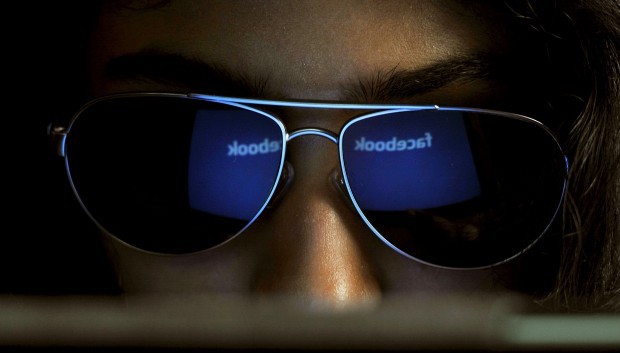
The ‘Facebook’ logo is reflected in a young woman’s sunglasses. (Manjunath Kiran/AFP/Getty Images)
The media scene was monolithic under Tunisia’s old government, while the public arena was characterized by the absence of politics. A news booth in Tunisia three years ago looked like a display of a duplication of one picture in different colors. Heated discussions concerned football matches and Star Academy rather than government shuffles and upcoming elections. The uprisings have changed this picture, only now, Tunisia has rumors and conspiracy theories instead of a free press and innovative revolutionary politics.
Tunisia’s main media outlet is neither a journal nor a television: it is Facebook. The expression ‘Seen on Facebook’ is widely used, be it by shisha smokers, leading politicians, the president or my grandmother. The danger here is that most of the shared videos and pictures on the site are accompanied by biased comments and sometimes inaccurate information, written by administrators who are usually unemployed 16–25-year-olds.
On the other hand, the fact that many Tunisians discovered politics through Facebook makes it the ‘alma mater’ of their political education. So while a School of Oriental and African Studies student of politics graduates under the influence of post-colonial theory, and while say a Stanford international relations master’s degree candidate finishes their essays with a realist conclusion, most Tunisians end up analyzing conspiracy theories in which the main players are America, Zionism, Freemasonry, Iran, and sometimes Turkey or Qatar. Take the aftermath of Chokri Belaid’s assassination, for instance: It was first reported on a Facebook status. And it was on this social networking site that the rumors grew about the number of bullets used, the number of people involved, when he died, and so on.
The polarization of Tunisian politics is easily found on Facebook. Big pages and influential Facebookers are largely pro- or anti-government, or pro- or anti-Muslim Brotherhood (Ennahdha). So on the day of the murder, one side was accusing Ennahdha while the other was alluding to a French–Algerian conspiracy with Mossad links and the possible participation of Belaid’s party members—and even his family. Some even hinted at a possible subterfuge. For the latter group, Belaid was still alive, and the whole story was concocted in order to incriminate the Islamists. They used pictures from the crime scene to consolidate their theses, and asked for his corpse to been shown to support their version of events.
What applies to Tunisia applies as well to Egypt, Libya, and other newly freed countries. Social media was at the avant-garde of free press when political debates were discouraged in the previous era. Facebook, however, has become a massive weapon of misinformation, and even the ‘dumbing down’ of society.
Censoring and punishment no longer work in inhibiting free speech. The newly elected governments should cease from producing dull propaganda or being on the counter-offensive. Implementing local workshops on politics and open debates is a viable solution, but it should be coupled with encouraging exhaustive training for journalists in order to improve their professionalism and make their articles more appealing to the common citizen than a random Facebook post.
